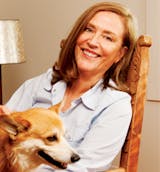A person gets to a certain age and realizes that some dreams are never going to come true. She’ll never date Daniel Day-Lewis. She’ll never sort her junk drawer. She’ll never tell Alex Trebek, “What is the Crab Nebula?” Which is why, when a rare third chance at the dream deferred arrived in the mail, I grabbed at it.
“Dear Prospective Juror,” the summons began, just as the previous two invitations had. The first time, lured by the promise of $6 a day, I’d eagerly trotted over to the courthouse, only to be dismissed for obvious bleeding heart tendencies. The second time, I didn’t wear the dashiki but the defendant settled. This time, I knew I had to admit the real reason I ached to come out on the right side of voir dire: Becoming a lawyer had always felt inevitable to me, as it does to so many people who are still annoyed at the Arabs for their “gift” of the zero (nine digits baffling us in the cruel charade known as “mathematics” aren’t enough? Thanks. For nothing).
“I’m glad you’re finally going to do something with your life” was my father’s response when I announced, after the third magazine I had been freelancing for went belly-up, that I’d signed up to take the Law School Admission Test. He too was horrible at math and had actually been in law school until the Korean War intervened. With this proud genetic heritage and my inborn love of the lie, I was sure to be a natural.
It came as a shock, therefore, that I sucked so dramatically at taking the practice LSATs. Ever the grade-grubbing drudge, I bought a study guide and dug back in, determined to train my sloppy synapses to fire in logical, lawyerly ways. I eased the pain somewhat by cramming at my friend Stacy’s house, where I could flirt with her handsome brother, Andy, who was spending his shore leave with her. Though Andy was scary-smart, his affection for the imbibables had led him to a career where such a hobby is, if not a prerequisite, then at least a given: working on an oil tanker.
“What is that?” Andy asked, putting down his constant companion, Johnnie Walker, and reaching his work-scarred mitt in the direction of my study guide.
Since Mr. Walker was at half-mast, I explained slowly and clearly about the LSAT.
“I’m drunk, not deaf,” Andy clarified. “Hit me.”
We put the test between us, set the timer, and dived in. For the next 24 minutes I agonized over questions like “If it is true that all left-handed people live in apartments and David is left-handed, can we conclude that David (a) lives in an apartment, (b) has never lived anywhere, (c) has an infected cuticle?” Andy, on the other hand, was so blitzed that he almost seemed to be enjoying the torture, murmuring thoughtful little “mmms” between swigs as he stroked his chin and pondered David’s plight. I was both saddened and cheered that Andy didn’t even realize how mind-fryingly hard this was. By the time I reached a problem involving five runners in a race—I, K, L, M, and E—and had to order them from first to last knowing only that M had plantar fasciitis, I wrote “KILME” just as the timer went off. Need I add that Andy aced the LSAT, got a full scholarship to Georgetown, and was heavily recruited for cushy jobs? Or that I went on to pen Verdict: Desire in the First-Degree?
Clutching the summons to my breast, I swore that at long last I would have my day in court. The first hurdle to clear as a prospective juror is impaneling, a Darwinian process in which only the fittest survive—and/or those who are eighteen, citizens, and not currently under indictment. Check, check, and double check. After a few more qualifying rounds, I made it: I was officially in the jury pool. Now I just had to be selected.
I showed up at the courthouse on the appointed day wearing clothes so innocuous that I could have campaigned for president in Iowa. I stopped at the ladies’ room to practice looking both sympathetic and bloodthirsty, a Diane Sawyer—Torquemada combo sure to appeal to lawyers on either side.
By the time I found my way to the right room, however, potential jurors were already being thanked for their time and dismissed. Dismissed? Once again, some weasel had settled? Rather than give me the opportunity to sentence him to hard time, he had wimped out and taken the deal? Uh-uh. Not this time. This time it was personal. I stomped over to the jury office and made my demand.
The clerk squinted at me and repeated, “You, you want to be put on a jury?”
“Yes, if it pleases the court, I can start today. This very afternoon.”
The clerk removed her reading glasses so she could get a really good look at me, then swiveled around and called out to the other clerk, “She wants to be put on a jury.”
After absorbing this novel request, they both seemed pleased in the way you are when you meet someone who shares an unusual interest with you. Say, stamp collecting or being a vulture at supergory trials.
“Oh, let’s find her a good one,” the second clerk said, fingers skittering across the keyboard. She studied the screen, then me, shook her head, turned back, and brought up another screen. “Okay, this is more like it! We got that rape-strangulation coming up in three weeks.”
Eager to top her, the first clerk chimed in, “No, hold on, put her up for that triple homicide.”
“The torture-dismemberment? Whose court is that one in?”
“Actually . . . ” I interrupted. “Maybe I’ll just hang on until my next summons.”
“Just give us a sec,” the first clerk pleaded. “We can find a good one for you.”
“No, really,” I insisted. “Now that I think about it, my schedule is going to be pretty full for a while. Jam-packed, in fact.”
That’s what I told the ladies, but the hard truth I finally had to accept was that being bad at math and loving a wee drop now and again would probably never have been enough to sustain me in my legal career. Sadly, members of the jury, I’ll have to rest my case.









